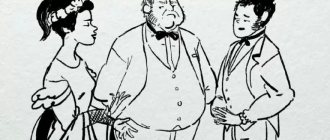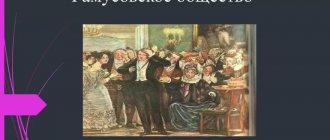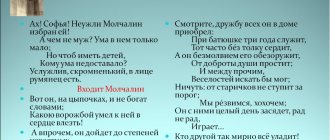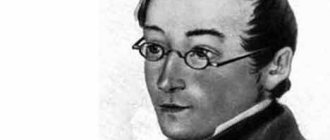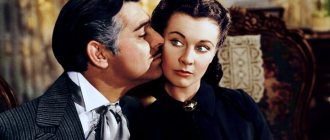Quotes about Chatsky
The full name of the hero is Alexander Andreevich Chatsky:
“...Alexander Andreevich Chatsky...”
Alexander Chatsky - nobleman, landowner with 300-400 serfs:
“- had three hundred souls. - Four hundred, please understand...”
Chatsky is a single man. He is still young, but no longer “falls into childishness”:
“...Yes, I’m not married...” “...Now I can’t fall into this childish behavior...”
Chatsky is a lonely man. His mother and father died when he was a child. Chatsky’s father was a friend of Famusov:
“...Here you go – Chatsky, my friend, / Andrei Ilyich’s late son...”
“...Chatsky, my friend, / Andrei Ilyich...”
After the death of his parents, Chatsky was brought up in Famusov's house. Having matured, he began to live separately:
“...Yes, with Chatsky, it’s true, we were brought up and grew up; / The habit of being together every day inseparably / Tied us with childhood friendship...”
“...but then / He moved out, he seemed bored with us, / And rarely visited our house...”
Chatsky has been friends with Sofia Famusova since childhood and has loved her for a long time:
“...I remember you often danced with him as a child...”
“...And yet I love you madly...”
At the beginning of the play, Chatsky returns to Moscow after 3 years of “wandering around the world”:
“...I haven’t written two words for three years! / And suddenly it burst out as if from the clouds...”
“...Scoured the light...”
“...The desire to wander attacked him...”
Chatsky is a member of the English Club, which consists of rich, noble nobles:
“...Then, think, a member of the English Club...”
Alexander Chatsky is a smart, witty man:
“...Oster, smart, eloquent...”
“...he’s a smart guy / And he writes and translates nicely. // You can’t help but regret that with such a mind...”
Chatsky is an eloquent person:
“...smart, eloquent...”
“...What does he say! and speaks as he writes!..”
Alexander Chatsky likes to make jokes and “tease” people, but he does not do this with the intention of harming:
“...and cheerful and sharp...”
“...Listen, are my words really all caustic words? / And tend to harm someone?..”
“...Not a man, a snake!..” (Sofia about Chatsky)
Chatsky is a mocking person, but his ridicule is always directed against stupid and narrow-minded people:
“...He knows how to make everyone laugh nicely; / Chatting, joking..."
“...Look at you for laughs, Chatsky will make you laugh...”
“...It’s noticeable that you are ready to pour out bile on everyone...”
“...A hail of your barbs and jokes will break out. / Tell jokes! and joke forever! How will you react to this!..”
“...Ah, Chatsky! You love to dress everyone up as jesters...”
Chatsky often talks to others in a harsh tone:
"…Yes! a menacing look, and a harsh tone, / And there are an abyss of these features in you...”
According to Sophia, Chatsky is intemperate in his tongue and too openly despises people:
“Why should there be, I’ll tell you straight,
So I will not control my tongue?
In contempt for people so openly?
Chatsky is a proud man, “proud,” according to Famusov:
“That’s it, you are all proud!..”
Alexander Chatsky is a free-thinking person, for which Famusov calls him a “Carbonari” and a “Jacobin”:
"…Oh! My God! he is a Carbonari*!..” (*that is, a revolutionary)
"…A dangerous person!.."
“...I think he’s just a Jacobin*...” (*that is, a freethinker)
Chatsky is an independent person. He does not want to depend on others, such as Molchalin:
Molchalin: After all, you have to depend on others.
Chatsky: Why is it necessary?..
Chatsky quit military service and also decided not to serve as an official. Among the nobles, it was customary to choose one of these two employment options, but Chatsky does not engage in either one or the other:
Princess. Retired?
Natalya Dmitrievna. Yes, I was traveling and recently returned.
According to Chatsky, nobles should not limit themselves only to bureaucratic or military service. He believes that an intelligent person can also find himself in creativity or science:
“Of the young people, there will be an enemy of quest, // Without demanding either a place or promotion to rank, // He will focus his mind on science, hungry for knowledge; // Or God himself will arouse the heat in his soul // To the creative, lofty and beautiful arts...”
Chatsky is a sincere person, not a pretender:
“…Once in my life I’ll pretend…”
Alexander Chatsky loves the truth:
“...Why should I deceive myself?..”
“...Why didn’t they tell me directly...”
Chatsky is a sensitive person:
“...Who is so sensitive, and cheerful, and sharp, / Like Alexander Andreich Chatsky!..”
Alexander Chatsky is a passionate, ardent person:
“...that passion? that feeling? that ardor?..
“...But what is boiling inside me now, worries me, infuriates me, / I wouldn’t wish it on my personal enemy...”
Chatsky has his own opinion about everything:
“...Why are other people’s opinions only sacred?..”
Alexander Chatsky is a patriot. He loves the Russian people and Russia:
“...So that our smart, cheerful people...”
In high society, Chatsky is considered crazy because of his freethinking and liberal views:
“...You glorified me as crazy with the whole choir...”
Chatsky does not like the “human crowd” and the Moscow Famus society. At the end of the play he leaves Moscow:
“...And in the crowd I am lost, not myself. / No! I am dissatisfied with Moscow..."
“...Get out of Moscow! I don't go here anymore. / I’m running, I won’t look back, I’ll go searching around the world...”
Winged expressions from “Woe from Wit” by Griboyedov
Author: Dmitry Sirotkin
I present to you a selection of popular expressions from “Woe from Wit” by Griboyedov .
It included 70 expressions.
Winged expressions are summarized in thematic groups: love and women, the past and its representatives, retrogrades, liberals, post-mediocrity, superfluous people, admiration for the foreign, lofty matters. With an indication of the modern meaning of the expression, character and action of the play.
Winged expressions about love and women
- Happy people don’t watch the clock (when people are happy, they don’t notice how quickly time passes; Sophia, act I, scene 3)
- But because they are patriots (about attempts to justify their simple everyday calculations with lofty patriotic words; Famusov, act II, phenomenon 5)
- They won’t say a word in simplicity, everything is with an antics (about female affectation; Famusov, act II, scene 5)
- The women shouted: hurray! And they threw caps into the air (a playful and ironic characterization of social upsurge; Chatsky, act II, scene 5)
- Tell love the end who goes far away for three years (variation on the theme “Out of sight, out of mind”; Chatsky, act II, scene 14)
- How can you not love the bartender Petrusha! (about a simple, handsome young man; Lisa, act II, scene 14)
- The hero is not my novel (not my type; Sophia, act III, scene 1)
- Attraction, a type of illness (about an unconscious, not controlled by the mind, addiction to something or someone; Repetilov, act IV, phenomenon 4)
- To the village, to my aunt, to the wilderness, to Saratov! (about the desire to leave the bustle of the city, to find a calm shelter; Famusov, act IV, phenomenon 14)
You can also read the review of phraseological units about love from the works of writers
Catchphrases about the past and its representatives
- The legend is fresh, but hard to believe (about phenomena of the past that are difficult to imagine in today’s life; Chatsky, act II, phenomenon 2)
- The present century and the past century (about the past and present times in the order of their comparison; Chatsky, act II, phenomenon 2)
- The meanest features of the past life (about the past that outrages the speaker and to which he does not want to return; Chatsky, act II, phenomenon 5)
- The times of the Ochakovskys and the conquest of the Crimea (about something hopelessly outdated, dating back to time immemorial; Chatsky, act II, phenomenon 5)
- Where, tell us, are the fathers of the fatherland whom we should take as models? (regarding the domestic “elite” and “fathers of the fatherland”, who do not at all correspond to such self-designations; Chatsky, act II, phenomenon 5)
- What a word is a sentence! (about someone’s decisive judgments; Famusov, act II, phenomenon 5)
- They will argue, make noise and disperse (about empty, meaningless conversations, discussions; Famusov, act II, phenomenon 5)
Catchphrases about retrogrades
- We would learn by looking at our elders (about imposing “grandfather’s” views and approaches to business on youth; Famusov, act II, phenomenon 2)
- Well, how can you not please your loved one? (about nepotism, nepotism, protectionism; Famusov, act II, phenomenon 5)
- I will give you a sergeant-major in Voltaire (about obscurantism, the desire to instill in everything the spirit of the barracks and unreasoning obedience; Skalozub, act II, phenomenon 5)
- The houses are new, but the prejudices are old (about external changes and the unchanging internal essence of something; Chatsky, act II, phenomenon 5)
- Who are the judges? (about contempt for the opinions of authorities who are no better than those whom these judges are trying to blame and criticize; Chatsky, act II, phenomenon 5)
- If evil were to be stopped, all the books would be taken away and burned (phrase-symbol of obscurantism, attacks on progress and enlightenment; Famusov, act III, phenomenon 21)
- Learning is a plague; learning is the reason (phrase-symbol of obscurantism, obscurantism, conscious ignorance; Famusov, act III, phenomenon 21)
- What will Princess Marya Aleksevna say? (about sanctimonious, philistine dependence on other people’s opinions; Famusov, act IV, phenomenon 15)
Catchphrases about liberals
- Let's make noise, brother, make noise! (about noisy but fruitless meetings, especially political ones; Repetilov, act IV, phenomenon 4)
- What is something about? - about everything (about idle talk pretending to wisdom; Repetilov, act IV, phenomenon 4)
- Yes, an intelligent person cannot help but be a rogue (ironically about someone’s unseemly actions or cynical life principles; Repetilov, act IV, phenomenon 4)
Catchphrases about mediocrity
- It will reach known levels, because nowadays they love the dumb (about an unworthy person who achieves his goals through servility, flattery and ostentatious humility, since both the views and interests of his superiors and the social atmosphere as a whole favor this; Chatsky, act I, phenomenon 6)
- At my age I should not dare to have my own opinion (about a person who does not have his own opinion or is afraid to express it; Molchalin, act III, phenomenon 3)
- Moderation and accuracy (about the manifestation of mediocrity, conformism; Molchalin, act III, phenomenon 3)
- Day after day, tomorrow is like yesterday (about the routine, monotonous passage of time; Molchalin, act III, phenomenon 3)
- Who lacks intelligence to have children? (about the unpretentiousness of philistine life; Chatsky, act III, phenomenon 3)
- Silent people are blissful in the world! (about a situation where it is not bright personalities who prosper, but faceless conformists, careerist officials, groveling before their superiors; Chatsky, act IV, phenomenon 13)
Catchphrases about “extra people”
- The mind and heart are not in harmony (about the internally contradictory perception of the environment; Chatsky, act I, phenomenon 7)
- Woe from the mind (it is difficult for an intelligent, progressive person to exist in an inert society of people with mediocre interests)
- I would be glad to serve, but it’s sickening to be served (about the desire to be useful, and not to please the authorities; Chatsky, act II, phenomenon 2)
- What does he say? and speaks as he writes! (about a well-structured presentation of progressive ideas; Famusov, act II, phenomenon 2)
- Yes, he does not recognize the authorities! (ironically about oppositional statements about the authorities or superiors; Famusov, act II, phenomenon 2)
- I'm strange, but who isn't? (statement about the individuality of a thinking person; Chatsky, act III, phenomenon 1)
- I am not a reader of nonsense, but even more exemplary (refusal to occupy one’s attention with any unsubstantial reading; Chatsky, act III, phenomenon 3)
- A million torments (in relation to all kinds of nervous, long, varied efforts, as well as heavy thoughts, doubts regarding any important matter; Chatsky, act III, phenomenon 22)
- There is something to despair from (as a characteristic of a complex, confusing state of affairs; as a reaction to unpleasant circumstances; Chatsky, act IV, phenomenon 4)
- I don't go here anymore! (about reluctance to visit a place where a person is not understood, upset, etc.; Chatsky, act IV, phenomenon 14)
- I’ll go search around the world where there is a corner for offended feelings! (jokingly exaggerated about his offense, disappointment; Chatsky, act IV, phenomenon 14)
Winged expressions about admiration for foreigners
- We are accustomed to believing that without the Germans there is no salvation for us (about blind admiration for foreign experience, lack of self-esteem; Chatsky, act I, scene 7)
- Mixing languages: French with Nizhny Novgorod (about the illiterate or inappropriate use of foreign words or expressions in someone’s speech; Chatsky, act I, phenomenon 7)
- Why are other people's opinions only sacred? (about admiration for everything foreign; Chatsky, act III, phenomenon 3)
- Slavish, blind imitation (about the uncritical acceptance of everything foreign; Chatsky, act III, phenomenon 22)
- The Frenchman from Bordeaux (about foreigners who in Russia enjoy immoderate adoration as “teachers of life”; Chatsky, act III, phenomenon 22)
- Contrary to reason, in defiance of the elements (about the rash, hasty actions of a stubborn, narrow-minded person; Chatsky, act III, phenomenon 22)
Winged expressions about high matters
- Philosophize - the mind will spin (usually used as a form of playful refusal to discuss any complex, abstruse issues; Famusov, act II, phenomenon 1)
- About Byron, well, about important mothers (about some important, “scientific” topic of conversation; Repetilov, act IV, phenomenon 4)
Catchphrases about fathers and sons
- There is no need for another model when the example of the father is in the eyes (ironically about parental authority; Famusov, act I, phenomenon 4)
- What a commission, creator, to be a father to an adult daughter! (about the difficulty for a father to understand the interests and needs of a young daughter; Famusov, act I, phenomenon 10)
Other catchphrases from “Woe from Wit”
- Pass us away from all sorrows, both lordly anger and lordly love (it is better to stay away from the special attention of people on whom you depend, since from their love to their hatred there is only one step; Lisa, act I, phenomenon 2)
- Is it possible to choose a nook and cranny for further walks? (please do not disturb, do not enter, do not come anywhere; Famusov, act I, scene 4)
- Walked into a room, ended up in another (about an explanation that doesn’t look very convincing; Sophia, act I, scene 4)
- Signed, off your shoulders (about the bureaucratic approach to issues being resolved; Famusov, act I, phenomenon 4)
- It’s good where we are not (an example of worldly wisdom about the unattainability of the ideal; Chatsky, act I, phenomenon 6)
- And the smoke of the fatherland is sweet and pleasant to us (about love, affection for one’s fatherland, when even the smallest signs of one’s own, one’s native cause joy and tenderness; Chatsky, act I, phenomenon 6)
- Blessed is he who believes, he is warm in the world! (ironically about someone who is too trusting or is too deluded by his rosy plans and hopes; Chatsky, act I, scene 6)
- More in number, cheaper in price (about an economical approach that does not take into account the quality of what is purchased; Chatsky, act I, phenomenon 7)
- With feeling, with sense, with arrangement (without haste, expressively, meaningfully, methodically; Famusov, act II, phenomenon 1)
- All Muscovites have a special imprint (about what is typical of all Muscovites, what distinguishes them from residents of other Russian cities; Famusov, act II, phenomenon 2)
- A distance of enormous size (about a large, incommensurable difference between something; Skalozub, act II, phenomenon 5)
- Evil tongues are worse than pistols (the moral suffering that slanderers or spiteful critics inflict on a person is sometimes worse than physical torment and death itself; Molchalin, act II, phenomenon 11)
- You won’t get well from such praises (about tactless, stupid praises that do more harm than good; Chatsky, act III, phenomenon 10)
- Calendars lie about everything (about all kinds of newspaper forecasts, weather reports, predictions of astrologers, interpretations of dream books; Khlestova, act III, phenomenon 21)
- Listen, lie, but know when to stop! (jokingly ironic advice to moderate your imagination, to at least somehow conform your inventions to the requirements of verisimilitude; Chatsky, act IV, scene 4)
- And here is public opinion! (about the absurdity of rumors, speculation, gossip, prejudices that should not be taken into account; Chatsky, act IV, phenomenon 10)
- Bah! familiar faces (used to express surprise at an unexpected meeting with someone; Famusov, act IV, phenomenon 14)
In conclusion, I note that the catchphrases (author’s phraseological units) from “Woe from Wit” by A.S. first place in the Russian language in terms of their number per work. This elite group also includes phraseological units from “Eugene Onegin” by A.S. Pushkin, phraseological units from “The Inspector General” and phraseological units from “Dead Souls” by N.V. Gogol, phraseological units from “The Twelve Chairs” and phraseological units from “The Golden Calf” by I. Ilf and E. Petrov.
I will also note that the catchphrases from “Woe from Wit” given here in a number of cases acquired a more universal meaning over time.
Alexander Sergeevich Griboyedov himself wrote that “the first outline of this stage poem, as it was born in me, was much more magnificent and of higher significance than now in the vain outfit in which I was forced to clothe it.” And further: “The childish pleasure of hearing my poems in the theater, the desire for them to succeed, forced me to spoil my creation as much as possible.” But I dare to suggest that this only benefited the play, saving it from excessive seriousness and thoughtfulness.
What gives it special liveliness and dynamism is the combination of features of a classic sitcom and the social drama of the “extra person” - Chatsky.
However, probably the main secret of the creative longevity of this work lies in the amazing vitality of the social problems and types of Russia presented in it. The Famusovs, Molchalins, Skalozubs, all in new guises, are in no hurry to leave the stage of history. Of the earlier Russian comedies that are still known, one can probably name only Fonvizin’s “The Minor” (by the way, phraseological units from “The Minor”).
Continuing the topic of the author's phraseological units, we can move on to the phraseological units of I.A. Krylov or to the phraseological units of A.N. Ostrovsky, or - to the phraseological units of A.P. Chekhov.
I will be glad to see your opinions and comments about Griboyedov’s phraseological units. I wonder which of them you use in your speech?
If you liked this article and wanted to share a link to it with your friends on a social network, then I’m all for it!
Just use the networking buttons below .
Chatsky's weaknesses
Alexander Andreevich, subtly noticing the characteristics of people’s character and behavior, easily teases and ridicules their vices and weaknesses. He does not try to offend or humiliate his interlocutors with words. Not everyone understands his barbs. He directs most of his judgments against stupid and intellectually limited people. He will make you laugh, make you look like a buffoon, so that the person being ridiculed may not even understand why they are making fun of him. Other weaknesses of the young landowner:
Sharpness of judgments. Angry - intonation changes:
"a menacing look and a harsh tone."
Pride. Chatsky does not accept disrespect:
“...you are all proud!”
Sincerity. Alexander does not want to be cunning, does not want to pretend. He cheats on himself only because of his love for Sofia:
“Once in my life I’ll pretend.”
Sensitivity. The quality of the hero distinguishes him from all the guests in Famusov's house. He is the only one who worries about the girl, does not believe in her changes, love for the insignificant Molchalin, without principles and moral principles.
Chatsky, the main character of “Woe from Wit” (see summary, analysis and full text), belongs to the best part of the then Russian young generation. Many literary critics argued that Chatsky is a reasoner. This is completely false! One can call him a reasoner only insofar as the author expresses his thoughts and experiences through his lips; but Chatsky is a living, real face; he, like every person, has his own qualities and shortcomings. (See also Image of Chatsky.)
Characteristics of Chatsky in “Woe from Wit”
We know that Chatsky often visited Famusov’s house in his youth and, together with Sophia, studied with foreign teachers. But such an education could not satisfy him, and he went abroad to travel. His journey lasted 3 years, and now we see Chatsky again in his homeland, Moscow, where he spent his childhood. Like any person who has returned home after a long absence, everything here is sweet to him, everything evokes pleasant memories associated with childhood; he takes pleasure in going over the memories of acquaintances in whom, by the nature of his sharp mind, he certainly sees funny, caricatured features, but he does this at first without any malice or bile, and so, for laughter, to embellish his memories: “a Frenchman, knocked down by the wind ...”, and “this... little black one, on crane legs...”
Going through the typical, sometimes caricatured aspects of Moscow life, Chatsky passionately says that when
“...you wander, you return home, And the smoke of the fatherland is sweet and pleasant to us!”
In this, Chatsky is completely different from those young people who, returning from abroad to Russia, treated everything Russian with contempt and praised only everything that they saw in foreign countries. It was thanks to this external comparison of native Russian with foreign language that gallomania developed in that era to a very strong degree, which so outrages Chatsky. His separation from his homeland, the comparison of Russian life with European life, only aroused an even stronger, deeper love for Russia, for the Russian people. That is why, having found himself again after a three-year absence among Moscow society, under a fresh impression he sees all the exaggeration, all the funny sides of this gallomania.
But Chatsky, who is hot by nature, no longer laughs, he is deeply indignant at the sight of how the “Frenchman from Bordeaux” reigns among Moscow society only because he is a foreigner; is indignant at the fact that everything Russian and national causes ridicule in society:
“How to put the European in parallel with the national is something strange!” –
someone says, causing general laughter of approval. Reaching the point of exaggeration, Chatsky, in contrast to the general opinion, says with indignation:
“At least from the Chinese we could borrow a little from their ignorance of foreigners.” ……………………… “Will we ever be resurrected from foreign rule, so that our smart, kind people, although based on our language, do not consider us Germans?” –
meaning by “Germans” foreigners and hinting that in society in that era everyone spoke foreign languages to each other; Chatsky suffers, realizing what an abyss separates millions of the Russian people from the ruling class of nobles.
I remember Griboyedov’s article, “Country Trip”; he describes a social picnic, during which a cheerful company, having accidentally arrived at a rural holiday, listens with curiosity to Russian songs and admires the round dance of peasant girls. “Leaning against a tree,” writes Griboyedov, “I involuntarily turned my eyes from the vociferous singers to the listeners-observers themselves, that damaged class of semi-Europeans to which I belong. Everything they heard and saw seemed wild to them; These sounds are incomprehensible to their hearts, these outfits are strange to them. By what black magic have we become strangers among our own? - “The people of the same blood, our people, are separated from us forever!”
In these words of Griboyedov the words of Chatsky sound. From this way of thinking of Chatsky-Griboyedov Slavophilism subsequently resulted.
From an early age, children were given a foreign upbringing, which gradually alienated secular youth from everything native and national. Chatsky casually sneers at these “regiments” of foreign teachers, “more in number, at a cheaper price,” who were entrusted with the education of noble youth. Hence the ignorance of one’s own people, hence the lack of understanding of the difficult situation in which the Russian people found themselves, thanks to serfdom. Through the mouth of Chatsky, Griboyedov expresses the thoughts and feelings of the best part of the nobility of that time, who were indignant at the injustices that serfdom entailed, and who fought against the tyranny of inveterate serf-owners. Chatsky (monologue “Who are the judges?..”) paints pictures of such arbitrariness in bright colors, recalling one master, “Nestor of the noble scoundrels,” who exchanged several of his faithful servants for three greyhounds; another, a theater lover, who
“I drove to the serf ballet on many wagons From the mothers and fathers of rejected children”; –
he made “all of Moscow marvel at their beauty.” But then, in order to pay off creditors, he sold off these children, who portrayed “cupids and zephyrs” on stage, one by one, separating them forever from their parents...
Chatsky cannot calmly talk about this, his soul is indignant, his heart aches for the Russian people, for Russia, which he loves dearly, which he would like to serve. But how to serve?
“I would be glad to serve, but being served is sickening,”
he says, hinting that among the many government officials he sees only the Molchalins or such nobles as Famusov’s uncle Maxim Petrovich.
In Famus society, Chatsky is alone: all public opinion is against him. Everyone around him believes that while serving, it is necessary to be served; no one sees evil in serfdom; everyone believes that the Russian, “national” cannot be put in parallel with the European, everyone is carried away by gallomania... This is where Chatsky’s grief comes from, his grief from the mind. He feels all the difficulty of a noble struggle with an entire society, the eternal struggle of “fathers and sons.” His soul experiences “a million torments” because of his ardent love for his homeland, which he wants, but cannot help. He does not understand that his words, his noble impulses cannot remain without fruit in the future. No wonder Goncharov said that Chatsky’s words were the thunder at which a Russian person is baptized (“A Million Torments”). Chatsky sees only the present and understandably suffers. To this “grief” of his mind is added a heartfelt grief - the betrayal of Sophia, whom he loves “without memory”. Mixed with disappointment in love is the bitter and humiliating consciousness of the one who is preferred to him! A man who embodies everything that is so disgusting to Chatsky. “Silent people are blissful in the world,” he says bitterly. It may seem strange that Chatsky, with his sharp mind and insight, does not see Sophia’s coldness at first glance, does not understand her barbs. This once again proves that Chatsky is a living person, and not a reasoner, a person capable of getting carried away and making mistakes. In the last act he reproaches Sophia:
“Why did they lure me with hope? Why didn’t they tell me directly?” –
whereas Sophia did not even think of “luring him with hope” and did not hide her coldness. Chatsky comes into violent despair when he learns about Sophia's love for Molchalin. His heartfelt grief merges with the suffering and grief of his mind, he seethes with indignation and is ready
“...to pour out all your life and all your frustration onto the whole world.” ………………… “Get out of Moscow!
he exclaims in his last monologue.
I don't go here anymore. I’m running, I won’t look back, I’ll go searching around the world, Where there is a corner for an offended feeling! Give me a carriage, a carriage!”
In this stormy outburst of despair, Chatsky’s entire ardent, unbalanced, noble soul is visible.
Chatsky's patriotism
Through the hero, Griboyedov conveyed his worldview. He cannot change the servility of the Russian people. He is surprised by the admiration for everything foreign. The author ridicules such aspirations of the landowners: foreign teachers, clothes, dancing, games and hobbies. He is confident that the Russian people should have their own teachers. The hero has a special relationship with language. He doesn’t like the fact that Russian speech has been made into a mixture of “French and Nizhny Novgorod.” He hears the beauty of Russian speech, its unusualness and melodiousness. Therefore, there are many popular words in speech: just now, Pushche, tea. He easily inserts proverbs and sayings into his speech and respects literature. Chatsky quotes the classics, but shows that foreign words should be present in the speech of an educated person, but only where they have a place.
Alexander Andreevich, like the entire advanced part of society, loves Russians, appreciates the people as they are:
“...our smart, cheerful people.”
But the hero divides all people into parts: the crowd, Famus’s entourage and new people. The latter live according to the laws of useful connections. They attend evenings, go to events during the week to please those on whom their position in society may depend. They are ready for humiliation:
“The row suddenly fell, on purpose.”
Chatsky calls for a change in lifestyle, to move away from conservatism and the old way of life. But his thoughts are perceived as madness.
The hero's love of freedom
Chatsky thinks freely and does not adhere to the rules imposed on him by the older generation. It is the speeches that frighten Famusov. The old landowner includes him among the Jacobins and Carbonari. He does not understand Chatsky's ideas. Freethinking causes fear and apprehension. The love of freedom led the young man to a path incomprehensible to old people. Two career lines were common throughout the century:
- military service;
- work as an official.
Chatsky became neither one nor the other. He did not accept the laws of the service, where established rules had to be obeyed. Service fettered a sensual person and interfered with his development. The role of an official did not suit Chatsky. Sitting behind routine and papers did not give me the opportunity to engage in creativity and research. Alexander is trying to find himself in scientific activity or in the niche of literary creativity:
“I put my mind into science...” “In my soul... there is a fervor for creative, high and beautiful arts.”
He is not interested in a position among officials, nor in promotions in the ranks of military service or civilian ranks.
Love of truth is the main character trait. The hero always gets to the truth, whatever it may be. It was freedom of thought and liberalism that allowed him to be classified as crazy.
Chatsky's education
Chatsky is a member of the English Club, which included rich and noble representatives of the nobility. He is intelligent, as evidenced by his ability to speak eloquently. From the words of the heroes of the comedy, it becomes known that the young man knows foreign languages and tries to write himself:
“He writes and translates well.”
Chatsky’s speeches are so correctly composed that it seems that he is not speaking, but writing. The young man’s progressive views are not similar to the positions of representatives of Famusov’s circle. It is knowledge and the desire for self-improvement that distinguish Alexander Andreevich from other heroes of the work. Famusov sees the reason for Alexander’s behavior in education:
“Learning is the plague, Learning is the reason...”
The fading nobility is ready to close schools, lyceums and gymnasiums, just so that the Chatskys do not appear in their way.
Inconsistency of character
Griboyedov is trying to bring the situation in the landowner's house closer to reality. This explains that all the heroes of the work have positive and negative traits, like ordinary people. Chatsky is no exception.
Intelligence and categoricalness. The hero's intelligence does not prevent him from being tactless. He does not analyze his judgments, and is not afraid to ridicule the defenseless. They cannot answer him in kind, since they are limited in mental capabilities. Only statements against immorality justify the behavior of the young nobleman. He tries to fight it with categorical judgments. But, as an intelligent person, he could understand that he was talking in vain. His statements do not reach those to whom they are directed. At times he just shakes the air. It feels like this is a conversation with yourself. It was this quality that A. Pushkin did not like. He believes that throwing pearls in front of the Repetilovs is not the job of smart people.
Love and passion. Another contradiction is the hero’s feelings. He is in love with a girl who chose someone else. Moreover, it is difficult to even simply compare them. Love made Chatsky blind. His passion and desire to find out who was preferred made him comparable to the funny characters at a comedy ball. I want the hero to leave the stage with his head held high, but he simply runs away from those who slandered him and started gossip.

